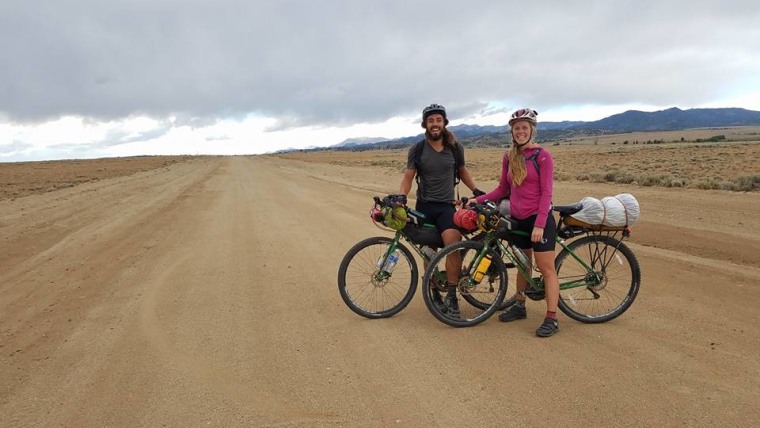For married couple Hannah and Connor Eaton, adventure is the best form of therapy. The Seattle couple make time together for regular day trips outdoors, says Hannah Eaton, 28, a marital and family therapist and wilderness guide.
These excursions give them a much-needed break from their typical responsibilities, provide them with a sense of shared wonderment, and help them build resilience in their relationship, according to Eaton.
“It really allows us to connect and reconnect and get to know one another on deeper levels without the distractions of technology and everyday life,” Eaton tells NBC News BETTER. “It can be very liberating and freeing just to be together with your backpack on your back or your bikes.”
Here’s how Eaton, the founder of Sequoia Immersions, a couples counseling service in Seattle that combines therapy with wilderness retreats, says couples can incorporate adventure into their relationship.
Take a day trip at least once a month
The more time couples spend outdoors together, the better, says Eaton. She and Connor take long wilderness trips together once or twice a year, but also make time for local excursions regularly around Seattle, whether it’s biking, hiking, or kayaking, “even if its a half day,” she says.
These short getaways give them much-needed alone time, she says.
“It’s a great time to catch up and to update one another on your inner world, what’s going on, what your dreams and ambitions are,” Eaton says, “and just further connect you as a couple, while enjoying the beauty and restorative properties [of nature].”
Choose a novel experience
If you and your partner aren’t accustomed to exercise or being outdoors, Eaton advises starting out with a small half-day trip. But she says to pick an experience that will challenge you and provide you both with a sense of novelty. The experience should be outside your comfort zone, but not so much that it will be too frightening or difficult for either of you, she says.
Embrace the adversity of nature
Spending time outdoors together will force you to work together and deal with conflict as a couple, says Eaton.
In their adventures, the Eatons have biked through lightning storms, chased down and mended ripped and blown-away tents in the rain, and have even run out of water together in the desert. It wasn’t fun at the time, but it made their relationship stronger, she says.
“When you are faced with those adversities, it really forces you to decide, ‘How are we going to face this?’” Eaton says. “We can face this as a team together, stay on one another’s side, or not.”
Be prepared
Before heading into the great outdoors, take caution, says Eaton, especially if you are inexperienced. Be sure to familiarize yourself with the trails and terrain, bring plenty of food and water and a first aid kit, and make sure you proactively think through anything unexpected that could happen.
For bigger excursions, she recommends hiring a guide, joining an outdoor group or taking friends with you who are experienced.
“It can be a really great entry point that can feel more comfortable and that won’t cause extra stress on the relationship,” Eaton says.
When you are faced with those adversities, it really forces you to decide, ‘How are we going to face this?’ We can face this as a team together, stay on one another’s side, or not.
Hannah Eaton
Set rules about phone usage
Remember: Your excursion is about spending time together, not your social media habit, says Eaton. Bring your phones, she says, but limit how you use them.
“The phone can be great in case of an emergency, or to take pictures together,” Eaton says, “but create some boundaries around how you want to use your technology in a way that supports the relationship and your health.”
MORE RELATIONSHIP ADVICE
- Not being heard in your relationship? Try 'active listening'
- Want a happier relationship? Pay attention to your partner's 'bids' to connect
- How thoughtful communication can improve your marriage, according to a divorce attorney
- Why this marriage counselor says a "good enough marriage" is one that lasts a lifetime
Want more tips like these? NBC News BETTER is obsessed with finding easier, healthier and smarter ways to live. Sign up for our newsletter and follow us on Facebook, Twitter and Instagram.

